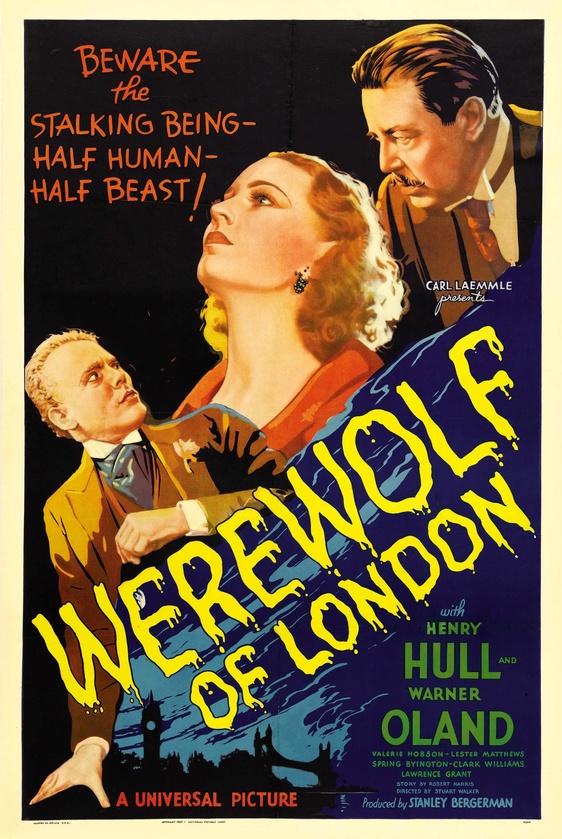Even though I was quite tired last night, one of the cats had been sick all day and around bedtime he decided to sit with me. It’s tough telling how much time he has left (he’s acting better today), so I decided to stay up and watch a movie.
The Peacock streaming service just added a bunch of Universal Monster Movies, and even though I have a blu-ray set I’ve barely touched, streaming is easier. Especially when you don’t want to disturb your cat. They also have a few movies that aren’t included in my set, such as last night’s feature, Werewolf of London.
Before Universal made their iconic The Wolf Man, they took another stab at the genre with this hour and fifteen minute film.
Werewolf lore is a little different here. Silver weapons aren’t required, for one thing. But that didn’t bother me one bit. The film opens with a couple of botanists in Tibet searching for a rare flower which only blooms by the light of the full moon. Dr. Wilfred Glendon (Henry Hull) is warned away from the valley, and even encounters an invisible force that tries to hold him back, but presses on anyway. He manages to get flower, but there’s a cost.
He gets mauled by a werewolf. Of course.
Somehow he gets back to England and his wife, Lisa (Valerie Hobson) before the next full moon. For some reason he doesn't bother to mention the attack, and since everyone is very proper they never see the scars on his arm. Once home, Glendon sets up the flower in his lab, which isn't quite Dr. Frankenstein’s lab, but it has artificial moonlight, a cool electric coil, and a Ring video doorbell. He’d rather experiment on the flower, but Lisa is hosting a party in the conservatory and he’s dragged out to socialize.
Glendon is a grouch, but doesn’t seem like a bad guy overall.
At the party he’s forced to interact with Lisa’s social circle, who doesn’t approve of him constantly jetting off to look for rare plants. At the party is another botanist, Dr. Yogami (Warner Oland), who was also in Tibet looking for the flower. He didn’t find it, but he may have been attacked by a werewolf. Yogami knows about and believes in the monsters, and tries to convince Glendon that he’s in trouble.
The only trouble Glendon is really worried about his wife’s old beau, Paul Ames (Lester Matthews), showing up.
Ames made his fortune in America and still carries a torch for Lisa. Everyone can see he’s a better fit for her, but this movie is from the 1930’s and she’d never cheat on her husband or leave him. But she will, against her husband's orders, go on a moonlit drive with him. Will they find a way to get together?
About going out at moonlight...
Here’s where it gets interesting and the lore develops. Werewolves are only active for two hours during the full moon, they must kill or become permanently transformed, and stabbing the stem of the moon flower into their hand can stop the transformation once it starts but only for that evening. To raise the stakes, while the werewolf doesn’t have to kill anyone in particular, it is drawn to whoever it loves the most.
Not good.
The transformation scene is cleverly done, as a little more makeup is added every time Glendon comes out from behind a pillar on his way to kill. It works more effectively than than the fades they also use. Sure it's a little silly that he bothers to put on a beret and jacket after his transformation, but this is a monster movie, so we just go with it. Glendon gets his required kills while managing to avoid Lisa, but we know it’s only a matter of time.
Werewolves are different from Universal Movies vampires, and I appreciate the distinction.
I won’t spoil the ending (as if you can’t see it coming), but there’s a great sense of tragedy here. Tragedy is when the hero is pursuing a good goal and comes to a bad end. And that’s exactly what these werewolf stories are. Vampires, on the other hand, are agents of pure evil. It’s strange the way things have changed in recent years, and I would prefer a return to the old archetypes. Vampires never needed to become Byronic heroes when werewolves filled that niche so much better.
Werewolf of London is definitely worth your time, short as it is. In some ways I like it more than The Wolf Man, as Glendon is a little less sleezy than Lon Chaney Jr.’s Talbot. I find him more sympathetic. If you watch it, let me know what you think.

























